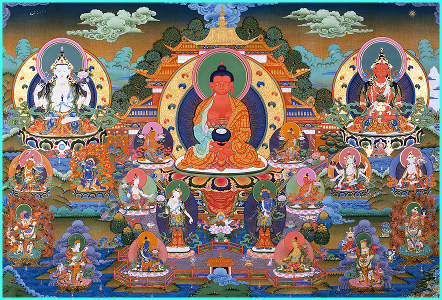Sukhavati: Difference between revisions
mNo edit summary |
No edit summary |
||
| Line 1: | Line 1: | ||
[[File:Sukhavati.jpg|frame|Sukhavati]] | [[File:Sukhavati.jpg|frame|Sukhavati]] | ||
'''Sukhavati''' (Skt. ''Sukhāvatī''; Tib. [[བདེ་བ་ཅན་]], ''Dewachen'', [[Wyl.]] ''bde ba can'' or ''bde ba chen'') is the blissful [[buddha field]] of [[Amitabha]] | '''Sukhavati''' (Skt. ''Sukhāvatī''; Tib. [[བདེ་བ་ཅན་]], ''Dewachen'', [[Wyl.]] ''bde ba can'' or ''bde ba chen'') is the blissful [[buddha field]] of [[Amitabha]]; one of the [[buddha fields of the five families]], said to be located in the western direction. | ||
In | |||
In Sukhavati, [[sentient being]]s experience neither physical pain nor mental suffering and the causes for their happiness are limitless. For this reason, this world is called Sukhavati (Land of Bliss).<ref>Reference needed.</ref> | |||
==Four Causes of Rebirth in Sukhavati== | ==Four Causes of Rebirth in Sukhavati== | ||
| Line 10: | Line 11: | ||
#Dedicating all one's sources of merit as causes for rebirth in that pure realm | #Dedicating all one's sources of merit as causes for rebirth in that pure realm | ||
[[Lala Sonam Chödrup]], in his famous commentary on the ''[[Prayer of Sukhavati]]'' | [[Lala Sonam Chödrup]], in his famous commentary on the ''[[Prayer of Sukhavati]]'', gives them as: | ||
#the support, visualizing the pure realm | #the support, visualizing the pure realm | ||
#accumulating merit and purifying obscurations | #accumulating merit and purifying obscurations | ||
Revision as of 21:52, 22 November 2023

Sukhavati (Skt. Sukhāvatī; Tib. བདེ་བ་ཅན་, Dewachen, Wyl. bde ba can or bde ba chen) is the blissful buddha field of Amitabha; one of the buddha fields of the five families, said to be located in the western direction.
In Sukhavati, sentient beings experience neither physical pain nor mental suffering and the causes for their happiness are limitless. For this reason, this world is called Sukhavati (Land of Bliss).[1]
Four Causes of Rebirth in Sukhavati
According to Jamgön Ngawang Lekpa, the four causes of rebirth in Sukhavati are:
- Generating bodhichitta
- Accumulating merit in many ways
- Repeatedly bringing the buddha field to mind
- Dedicating all one's sources of merit as causes for rebirth in that pure realm
Lala Sonam Chödrup, in his famous commentary on the Prayer of Sukhavati, gives them as:
- the support, visualizing the pure realm
- accumulating merit and purifying obscurations
- the aid, generating bodhichitta
- the circumstance, pure prayers of aspiration, dedicating all sources of virtue so that oneself and others may be reborn in Sukhavati
Literature
Sutras
There are three sutras by Buddha Shakyamuni that expound on the pure land of Sukhavati. The Kangyur includes Tibetan translations of two of these texts:
- Amitabhavyuha Sutra (Skt. Amitābhavyūhasūtra), which is also known as the “longer” Sukhavativyuha Sutra
- Sukhavativyuha Sutra (Skt. Sukhāvatīvyūhasūtra), which is also known as the “shorter” Sukhavativyuha Sutra
The third is only extant in Chinese:
- Amitayurdhyana Sutra (Skt. Amitāyurdhyānasūtra)
Prayers to Be Reborn in Sukhavati
- Brief Amitabha Mönlam, 'spoken' directly by Buddha Amitabha to Tertön Mingyur Dorjé
- Aspiration to be Reborn in the Pure Realm of Sukhavati (aka Dechen Mönlam or Dé Mön), by Karma Chakmé Rinpoche (aka Raga Asé)
Teachings Given to the Rigpa Sangha
- Sogyal Rinpoche, San Diego, 3 December 2010
- Sogyal Rinpoche, Lerab Ling, 5 September 2010
- Mingyur Rinpoche, Lerab Ling, 13 July 2008
- Orgyen Tobgyal Rinpoche, Sukhavati, Bad Saarow, Germany, 28 July 2018
Further Reading
- Gomez, Luis, trans., The Land of Bliss: The Paradise of the Buddha of Measureless Light: Sanskrit and Chinese Versions of the Sukhavativyuha Sutras (Honolulu: University of Hawaii Press, 1996)
- Georgios T. Halkias, Luminous Bliss: A Religious History of Pure Land Literature in Tibet (Honolulu: University of Hawaii Press, 2013)
- J. Eracle, La Doctrine bouddhique de la terre pure (Paris: Devry Livres, 1973)
- Trois Soutras et un traité sur la terre pure (Geneva: Aquarius, 1984)
- Tulku Thondup, Peaceful Death, Joyful Rebirth (Boston & London: Shambhala, 2005), Ch.7 'The Buddha of Infinite Light and His Blissful Pure Land'.
- Khenpo Karthar Rinpoche, Karma Chakme’s Mountain Dharma, vol 4, Ch. 5 Riding the Supreme Steed Balaha: Reaching a Pure Realm, 2010
External Links
 The Display of the Pure Land of Sukhāvatī
The Display of the Pure Land of Sukhāvatī Amitābha and Sukhāvatī Series on Lotsawa House
Amitābha and Sukhāvatī Series on Lotsawa House- The Three Pure Land Sutras, translated from Chinese by Inagaki, Hisao, 2003
- Khenpo Sodargye's teachings on the practice of Amitabha
- Khenpo Sodargye's teachings on the Pure Land of Amitabha
- Prayers and Practices to be Reborn in Sukhavati by Panchen Losang Chökyi Gyältsen and Lama Tsongkhapa (FPMT, 2014)
- ↑ Reference needed.